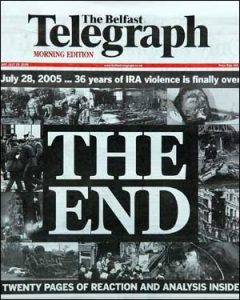Irish Question and Troubles in Northern Ireland
The Irish Question was politically significant in the 19th Century. Ireland was ruled from Westminster. The majority in the southern counties of Ireland wanted Home Rule, or independence. In the Northern Counties of Ulster, the majority wished to remain within the United Kingdom. In 1916, a revolt against British Rule broke out in Dublin. The Easter Rising was quashed but sparked a Civil War. Ireland was partitioned into an Independent Republic and Northern Ireland. Divisions continued though, leading to Civil Rights Movements and ‘The Troubles’.

The Island of Ireland has had a long history of dominance from overseas. From the Normans onwards there has been a history of overlordship and rule from England. This has led to a fractious relationship at times. Absent landowners often had little regard for the people living and working on their estates. Irish Culture has been threatened and persecuted at times. The migration of British workers to the isle has led to a population that is divided in it’s loyalties, religions and cultures. Following Partition, these led to discrimination in parts of the island.
The Irish Question became an issue of parliamentary concern in the 19th Century. As the male franchise expanded, the views of the new electorate needed to be taken into account. Other parts of Britain’s Empire were beginning to gain semi-independence. Dominion status gave the likes of Canada her own government and devolved powers. For many, the same should be granted to Ireland. However to others Ireland, as part of the British Isles, was a natural part of the British Governmental system.
Political ideals and resentment of maltreatment led first to Civil Rights campaigns, them to a rise in Sectarian violence. Paramilitary organisations grew in size, creating no-go areas for the authorities. These groups used force against opposing Paramilitary groups, targeted politicians and the authorities. Terror tactics were adopted by some elements of these groups. Bombings were at times common, fear was ever present.
The Republicans and Unionists were brought to the negotiating table in the 1980’s. Leading politicians and international bodies assisted in working out a compromise. The Good Friday Agreement was signed in 1998. It signalled the end of al out hostilities between Paramilitary groups and the beginning of a power sharing system of government for Northern Ireland that is still in place.
| Ireland: Home Rule, Troubles, Peace | ||
|---|---|---|
| Home Rule | Easter Rising, 1916 | Partition of Ireland |
| The Troubles, 1968-1972 | Worksheets and Classroom Activities on the Troubles in Northern Ireland | |
